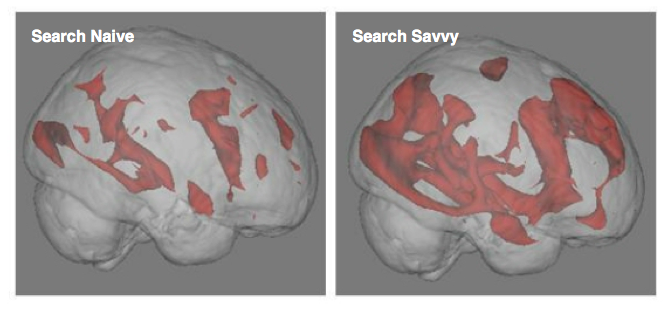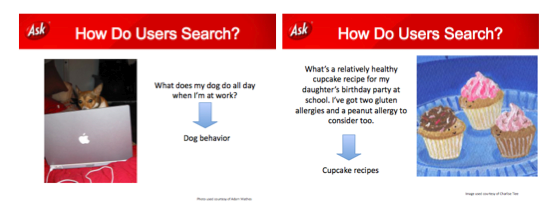
This was the second straight year I attended SMX West. It’s still the best search conference I’ve been to, but a number of the sessions were nearly the same as the prior year. However there were enough new sessions to keep me busy and stoke my interest. Among those new sessions the surprise of them was ‘Search Behavior: Using Research To Improve Results’.
Search Behavior: Using Research To Improve Results
The session was on the third day right after lunch. It had been a long conference and many were more interested in attending ‘Ask The SEOs’ to see if any sparks would fly with Aaron Wall on the panel.
The few that did attend got an entertaining, theoretical, scientific and academic review of search. The panel was composed of Gordon Hotchkiss, Carla Borsoi, Venkat Kolluri and Shari Thurow.
The Brain on Search
Gordon Hotchkiss from Enquiro presented some academic research from UCLA that showed brain function by level of search savvy.

An interesting point of reference was that the search savvy develop habitual search patterns. This would clearly make it difficult to change the search interface in any major way without disrupting those patterns. How long might it take to rewire the brain to get the most out of search? And what new pattern would emerge as a result? It makes any Google 2.0 interface extremely risky and unlikely.
Types of Search
I’ve long been interested in the different types of search: information, navigation and transaction. I’ve had personal experiences in optimizing information and transaction based sites and there is evidence that the habitual pattern for each search type varies. Let me tell you, the SEO strategy is different.
Shari Thurow from Omni Marketing Interactive explored each type of search, mixed in personas and tossed in an F-bomb to boot. There are a number of ways you can use this information, not the least of which is to craft better titles and meta descriptions to match the search type and intent. Rank matters (a lot) but, just like PPC, good copy can also move the needle.
How Do Users Search?
Carla Borsoi from Ask also spoke about information search, looking at how users search. The focus was on questions and the few examples she provided are illuminating.

Here you’re seeing the question a user really wants to ask versus what they actually type into a search engine. Clearly, matching queries with intent is a tough business. It’s one of the reasons why all of the search engines have moved to search suggesters so that they can better match query intent.
The Search Behavior session may not have been the most actionable of sessions. There were no tips, tools or lists of resources that you could use immediately. You didn’t get insight (overt or between the lines) from a search engine representative. What you did get was a rich background into the psychology of search and the implications it may have on our industry now and in the future.
In other words, you saw the forest and not the trees.
The Next Post: Google, is there a …
The Previous Post: Google Caffeine Is Not An Algorithm Change

1 trackbacks/pingbacks
Comments About The Best SMX West Session You Didn’t Attend
// 1 comments so far.
Craig Addyman // December 14th 2010
Kind of on topic : /
I have just ordered Influence: Science and Practice have you read it?
Would you recommend anything else like it?
Sorry, comments for this entry are closed at this time.
You can follow any responses to this entry via its RSS comments feed.